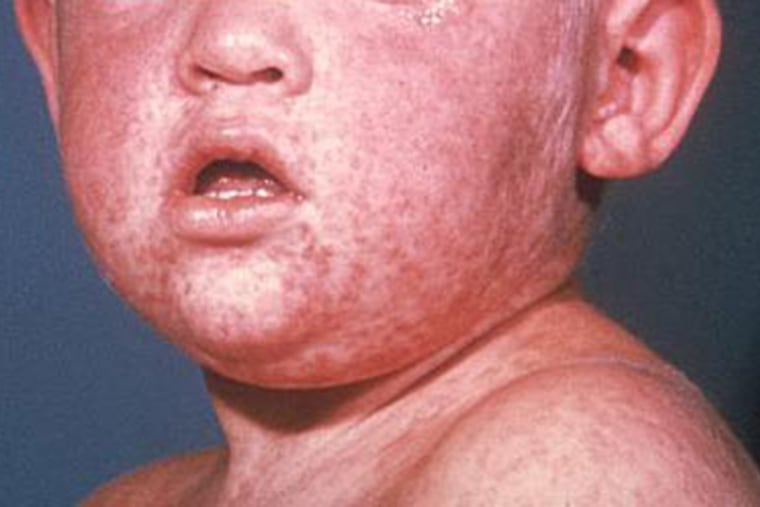Two more day-care children are infected with the measles. Here’s what to know about the outbreak in Philadelphia.
The outbreak spread from the Children's Hospital of Philadelphia to a daycare when a person with measles violated quarantine guidelines.

Five children attending a day-care center in Northeast Philadelphia have been sickened with measles, health officials said this week, confirming two more cases there.
In all, the city has identified eight cases in a growing outbreak.
Six of the people infected have been hospitalized to treat the infection, and all later discharged. The outbreak began in Children’s Hospital of Philadelphia in early December and spread to a day-care center on Castor Avenue.
» READ MORE: Health department warns of measles cluster among unvaccinated residents that originated with CHOP patient
The Inquirer spoke to Paul Offit, the director of the Vaccine Education Center at CHOP, to answer readers’ questions about measles and the vaccines.
Here is what Philadelphia residents need to know about the disease and how to protect themselves and their families:
Philadelphia’s current outbreak
In Philadelphia, the outbreak began last month with the hospitalization of an infant at CHOP who was recently in a country where the virus is more common. It took two days before the infant developed the rash characteristic to measles, and by that time, other patients were infected. They included an infant who was too young to get vaccinated, an unvaccinated older child, and the older child’s unvaccinated parent.
Before Christmas, one of the children with measles was in violation of quarantine guidelines and attended the Multicultural Education Station Day Care at 6919 Castor Ave. Since then, four other children at that day-care center have been diagnosed with the disease.
There have been no known infections outside of CHOP and the day-care center. Health officials continue to urge residents to get the MMR vaccine — which protects against measles, mumps, and rubella — and isolate for 21 days if they were exposed.
Measles is a highly infectious virus that spreads through breathing in infected air or touching infected surfaces, according to the U.S. Centers for Disease Control and Prevention. The illness can be especially dangerous for children under 5, pregnant people, and those with weakened immune systems.
How dangerous is measles?
Before the measles vaccines was available, 400 to 500 people died of the virus each year in the United States. In 2000, after three decades of vaccination efforts, the U.S. met the World Health Organization’s definition of having eliminated measles.
Without measles, some people seemingly forgot that the virus can make children incredibly sick, Offit said.
“We suffer the loss of memory of what measles can do,” he said.
A measles infection can lead to respiratory failure, inflammation of the brain, and death. The virus can also, in rare cases, cause a yearslong decline of the brain that results in death.
Of every 1,000 children who are infected with measles, between one and three will die, according to the Department of Health.
How contagious is measles?
By some measures, measles is seven times more contagious than COVID-19.
“You don’t have to have direct contact with someone with measles to get measles,” Offit said. “You just have to be in their airspace within two hours of them being there.”
This is why people who are exposed to measles and are not immune should follow the quarantine guidelines.
What are the symptoms of measles?
Measles symptoms appear up to two weeks after an exposure, according to the CDC. Initially, measles presents like a regular flulike illness: Patients may have a high fever, runny nose, and red, watery eyes.
After two or three days, small white spots may appear inside the mouth.
Three to five days after the symptoms begin, the rash commonly associated with measles breaks out. The rash usually begins on the face with small red spots that spread to the neck and body.
How effective is the measles vaccine?
The MMR vaccine is extremely effective at preventing measles.
Even just one dose of the MMR, which babies can receive when they are 12 months old, is 93% effective at preventing measles, according to the CDC. Two doses bring up that rate to 97%.
» READ MORE: Philadelphia measles outbreak grows to six cases
On the rare occasion that a person who is vaccinated against measles does get sick, their symptoms are generally milder.
People who were born before 1957 or have had measles are also considered immune.
Where can I get the MMR vaccine?
The decline in the number of parents who vaccinate their children could make outbreaks such as the one Philadelphia is currently experiencing more common and challenging to control, Offit said.
“It’s like the beginning of horror films, at some point one of the actors will say ‘did you hear something?’ and soon thereafter the monster appears,” Offit said. “That’s where we are.”
In Philadelphia, nearly 93% of children who attended kindergarten in Philadelphia public and private schools last school year had received at least two doses of the MMR vaccine, according to data from the Pennsylvania Department of Health. The rate of immunization for a disease as contagious as measles should be above 95%, Offit said. That is a vaccine coverage level that scientists define as herd immunity, in which enough of the population has immunity to a disease to block its spread.
The city is offering free MMR vaccines to all residents at three Philadelphia’s health centers. Residents can call 215-685-2933. Walk-in appointments are available Monday through Thursday, from 10 a.m. to noon and 1 to 3 p.m. in the following locations:
Health Center 3, 555 S. 43rd St.
Health Center 4, 4400 Haverford Ave.
Health Center 5, 1900 N. 20th. St.
For more information, visit the Department of Public Health’s measles website.